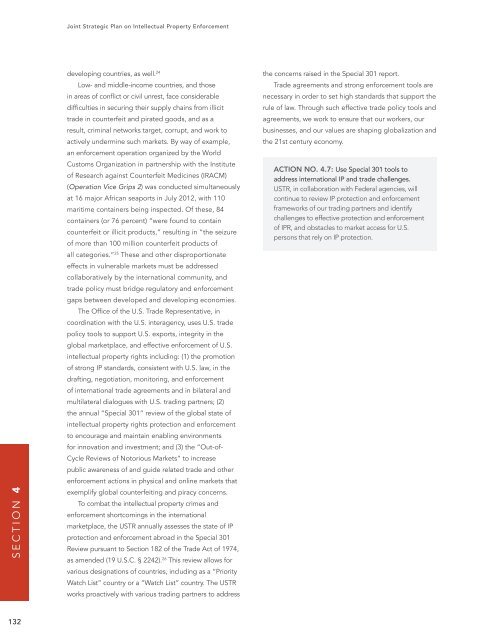ENFORCEMENT
eop_ipec_jointstrategicplan_hi-res
eop_ipec_jointstrategicplan_hi-res
Create successful ePaper yourself
Turn your PDF publications into a flip-book with our unique Google optimized e-Paper software.
Joint Strategic Plan on Intellectual Property Enforcement<br />
SECTION 4<br />
developing countries, as well. 24<br />
Low- and middle-income countries, and those<br />
in areas of conflict or civil unrest, face considerable<br />
difficulties in securing their supply chains from illicit<br />
trade in counterfeit and pirated goods, and as a<br />
result, criminal networks target, corrupt, and work to<br />
actively undermine such markets. By way of example,<br />
an enforcement operation organized by the World<br />
Customs Organization in partnership with the Institute<br />
of Research against Counterfeit Medicines (IRACM)<br />
(Operation Vice Grips 2) was conducted simultaneously<br />
at 16 major African seaports in July 2012, with 110<br />
maritime containers being inspected. Of these, 84<br />
containers (or 76 percent) “were found to contain<br />
counterfeit or illicit products,” resulting in “the seizure<br />
of more than 100 million counterfeit products of<br />
all categories.” 25 These and other disproportionate<br />
effects in vulnerable markets must be addressed<br />
collaboratively by the international community, and<br />
trade policy must bridge regulatory and enforcement<br />
gaps between developed and developing economies.<br />
The Office of the U.S. Trade Representative, in<br />
coordination with the U.S. interagency, uses U.S. trade<br />
policy tools to support U.S. exports, integrity in the<br />
global marketplace, and effective enforcement of U.S.<br />
intellectual property rights including: (1) the promotion<br />
of strong IP standards, consistent with U.S. law, in the<br />
drafting, negotiation, monitoring, and enforcement<br />
of international trade agreements and in bilateral and<br />
multilateral dialogues with U.S. trading partners; (2)<br />
the annual “Special 301” review of the global state of<br />
intellectual property rights protection and enforcement<br />
to encourage and maintain enabling environments<br />
for innovation and investment; and (3) the “Out-of-<br />
Cycle Reviews of Notorious Markets” to increase<br />
public awareness of and guide related trade and other<br />
enforcement actions in physical and online markets that<br />
exemplify global counterfeiting and piracy concerns.<br />
To combat the intellectual property crimes and<br />
enforcement shortcomings in the international<br />
marketplace, the USTR annually assesses the state of IP<br />
protection and enforcement abroad in the Special 301<br />
Review pursuant to Section 182 of the Trade Act of 1974,<br />
as amended (19 U.S.C. § 2242). 26 This review allows for<br />
various designations of countries, including as a “Priority<br />
Watch List” country or a “Watch List” country. The USTR<br />
works proactively with various trading partners to address<br />
the concerns raised in the Special 301 report.<br />
Trade agreements and strong enforcement tools are<br />
necessary in order to set high standards that support the<br />
rule of law. Through such effective trade policy tools and<br />
agreements, we work to ensure that our workers, our<br />
businesses, and our values are shaping globalization and<br />
the 21st century economy.<br />
ACTION NO. 4.7: Use Special 301 tools to<br />
address international IP and trade challenges.<br />
USTR, in collaboration with Federal agencies, will<br />
continue to review IP protection and enforcement<br />
frameworks of our trading partners and identify<br />
challenges to effective protection and enforcement<br />
of IPR, and obstacles to market access for U.S.<br />
persons that rely on IP protection.<br />
132


